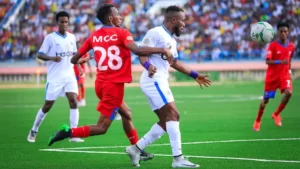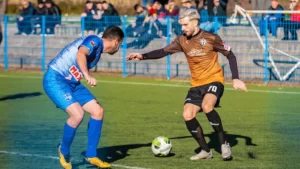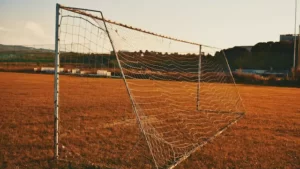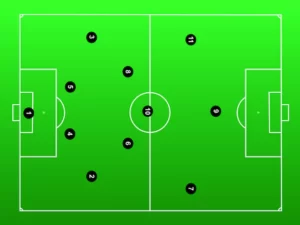In the ever-evolving world of football positions, goalkeepers assume a pivotal role in shaping match outcomes. As we enter 2023, the demands for a top-notch goalkeeper have progressed, necessitating a distinct skill set and a profound comprehension of the game. Whether you’re an aspiring goalie or a seasoned pro, this comprehensive Football Guide will furnish you with the essential knowledge and techniques to excel between the posts. Continue reading to unveil the secrets of becoming a standout goalkeeper in 2023.
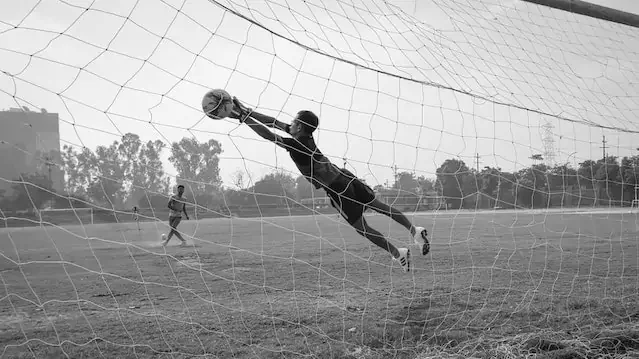
Brief history of the goalkeeper position in football (Soccer):
- The earliest accounts of football teams with player positions come from Richard Mulcaster in 1581 and do not specify goalkeepers.
- In the early days of organised football, when systems were limited or non-existent and the main idea was for all players to attack and defend, teams had a designated member to play as the goalkeeper.
- The word “goalkeeper” appeared in the Sheffield Rules of 1867, but the term did not refer to a designated player, but rather to “that player on the defending side who for the time being is nearest to his own goal”.
- The first international match with a designated goalkeeper was played in 1872 between Scotland and England.
- The first goalkeeper to wear gloves was William Sykes, a British soccer ball maker, in 1885.
- The rules of football were changed in 1912 to restrict goalkeepers from handling the ball outside the penalty area.
- The role of the goalkeeper has evolved over time, from a largely reactive position to a more proactive one, involving coming off the line to challenge strikers and distribute the ball with their feet.
Some of the most famous goalkeepers in history include:
- Lev Yashin (USSR): widely considered to be the greatest goalkeeper of all time, Yashin won the Ballon d’Or in 1963.
- Gordon Banks (England): Banks is best known for his save from Pele in the 1970 World Cup.
- Dino Zoff (Italy): Zoff won the World Cup with Italy in 1982, at the age of 40.
- Peter Schmeichel (Denmark): Schmeichel won the European Championship with Denmark in 1992 and the Premier League with Manchester United in 1993, 1994, and 1996.
- Manuel Neuer (Germany): Neuer is considered to be one of the best goalkeepers in the world, and he won the World Cup with Germany in 2014.
The Evolution of Goalkeeping in 2023
The game of soccer has witnessed significant changes over the years, and the role of the goalkeeper is no exception. In 2023, keepers are expected to be more versatile than ever before. Here are some key aspects to focus on:
- Reflexes: This is probably the most important skill for a goalkeeper. You need to be able to react quickly and make saves in a split second. There are a few exercises you can do to improve your reflexes, such as juggling balls or catching beanbags.
- Positioning: This is another essential skill for goalkeepers. You need to be able to position yourself correctly in order to make saves. This takes a lot of practice and experience. You can improve your positioning by watching videos of professional goalkeepers and by practicing with your teammates.
- Communication: Goalkeepers need to be able to communicate effectively with their defenders. This is important for organizing the defense and for preventing goals. You can improve your communication skills by practicing with your teammates and by listening to the instructions of your coaches.
- Decision-making: Goalkeepers need to be able to make quick and accurate decisions in goal. This is important for making saves and for preventing goals. You can improve your decision-making skills by practicing in game-like situations and by listening to the advice of your coaches.
- Handling: Goalkeepers need to be able to handle the ball effectively. This includes catching, throwing, and kicking the ball. You can improve your handling skills by practicing with different types of balls and by getting feedback from coaches and teammates.
- Distribution: Goalkeepers need to be able to distribute the ball effectively to their teammates. This is important for starting attacks and for keeping possession of the ball. You can improve your distribution skills by practicing different passing and kicking techniques.
In addition to these skills, great goalkeepers also need to be:
- Mentally tough: Goalkeepers need to be able to stay calm under pressure and to make saves even when they are tired or injured.
- Determined: Goalkeepers need to be determined to succeed and to never give up.
- Hardworking: Goalkeepers need to be willing to put in the hard work and dedication in order to improve their skills.
If you can develop these skills and qualities, you will be well on your way to becoming a great goalkeeper.
Here are some additional tips for becoming a great goalkeeper:
- Get regular practice. The more you practice, the better you will become.
- Get feedback from coaches and teammates. This will help you identify areas where you need to improve.
- Watch videos of professional goalkeepers. This will give you ideas for new techniques and strategies.
- Experiment with different techniques. There is no one right way to do things. Find what works best for you.
- Stay motivated. There will be times when you want to give up. But if you stay motivated, you will eventually achieve your goals.
Result
The goalkeeper is a vital position in football, and the best goalkeepers are able to make saves that win games. They are also responsible for organizing the defense and communicating with their teammates. The role of the goalkeeper is constantly evolving, and it will be interesting to see how it develops in the years to come.
FAQs
How can I improve my decision-making?
The best way to improve your decision-making is to practice in game-like situations and to listen to the advice of your coaches.
How can I improve my positioning?
The best way to improve your positioning is to watch videos of professional goalkeepers and to practice with your teammates. You can also try visualizing yourself in different goalkeeping situations.
How can I improve my reflexes?
There are a few exercises you can do to improve your reflexes, such as juggling balls or catching beanbags. You can also try playing goalkeeper against a wall or a friend.

